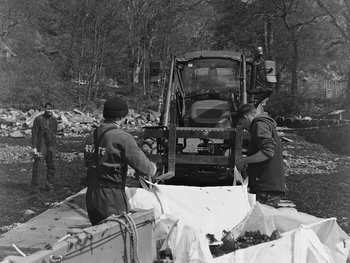Open Climate Solutions uses seaweed to develop nature-based solutions for climate change
2023-12-21
Open Climate Solutions is a Swiss non-profit organisation whose mission is to develop nature-based climate solutions that also support biodiversity and create benefits for society. They strongly believe seaweed is one of those solutions, and their ambition is to standardise seaweed farming and do research on biostimulants and biochar as nature-based climate solutions.
Can you tell us about Open Climate Solutions?
"Open Climate Solutions is a Swiss non-profit organisation whose mission is to develop nature-based climate solutions that also support biodiversity and create benefits for society.
If you look at many seaweed farmers today, there are only a few who can make a living in Europe, and they are often struggling. This is because of the high costs associated with seaweed farming and the uncertainties surrounding the offtake of the crop. We believe we need to standardise the production, harvesting and processing of seaweed so everyone can stop wasting time reinventing the wheel. And also facilitate the offtake.
The knowledge that we generate, we will make available open source to the largest extent possible to encourage collaboration across organisations and help for-profit companies in the seaweed space to build their businesses.
OCS was founded in 2022. We have a team of three people and are currently working with ca. 15 people across the value chain, including academia, seaweed farmers, terrestrial farmers and others. My background is in finance and business strategy around climate change. I'm hoping to apply my business experience in a way that is beneficial to the seaweed industry and helps it succeed.”

What is your belief in the potential of seaweed?
"Seaweed is such an amazing product. We know it is not a big leading industry yet in Europe. But if we can get it going, we can regenerate our oceans and create an industry that doesn't make the same mistakes as agriculture.
The beauty of biostimulants and biochar is that we are creating products that we can use to regenerate land while also regenerating our oceans. I love that connection between the ocean and the land.”
What is Open Climate Solutions working on right now?
"We are developing a new seaweed farm design to reduce costs, improve safety and standardise harvesting at a partner farm, Kilchoan Estate in Scotland. The estate focuses on expanding the field of ecological restoration and sharing their knowledge with society. In April, we were there for a first seaweed harvest.
The collaborative design emerged from two design thinking workshops that brought together a diverse group of participants, including seaweed farmers, researchers, industry experts, and marine engineers. Their collective input facilitated the development of the initial, practical, and viable design iteration. The farm design is built on open source and easily reproducible principles, that means, all components should be locally available, easy to source, easy to maintain, low tech and low budget and the knowledge about it is easily transferable.
We developed a segmented grow line system to reduce the time spent on water during harvest. Instead of spending lots of time cutting the seaweed from the grow lines, the individual segments including the seaweed will be brought on shore to be harvested and processed. This approach enhances time efficiency and enhances safety during the challenging and labour-intensive offshore harvest activities. Since we are committed to open sourcing what we develop, we started publishing the farm designs on our public GitHub account. On that note, we welcome feedback from the NSF community on the design to continue optimising.
We also strongly believe that farmers should own their farms and we aim to help and facilitate the offtake. A lot of farmers are struggling with their offtake. It's not that we have the solution yet, but we are working on a business model that works for everyone.”

Testing biostimulants and biochar
"As well as testing farm designs, we are also field testing products that we think really make sense at the moment. These are biostimulants and biochar. Biochar is charcoal produced by heating biomass, such as seaweed, to high temperatures in an oxygen-depleted environment. It can be used in agriculture and construction materials, amongst others, to sequester carbon more permanently.
We also want to show farmers that it makes sense to use biostimulants from seaweed. To do this, we are working with regenerative agriculture farms in Switzerland and Germany where we are currently testing some biostimulants that we have not produced ourselves but have sourced from partner organisations.
While there is scientific evidence for the positive effect of biostimulants, the reason we are doing this out of a non-profit and working with leading researchers is to objectively demonstrate this positive effect in field trials and sharing the results open source. With this, we hope to expand the acceptance of biostimulants amongst farmers. For this project we are working with researchers from ETH Zurich and other leading Swiss research institutes, as well as macroalgae cultivation experts, amongst others.”
What’s the ambition of Open Climate Solutions?
"In an ideal world, you could go to farmers and say: I'll buy 70 tonnes of your seaweed at X price in fall when they are seeding their farms, but today farmers have a difficult time even knowing who's going to buy their harvest and at what price. That's a big challenge. It would be amazing if we could help improve this situation and reduce this business risk.
Furthermore, if you want to scale up the seaweed industry in Europe, you have to standardise the different connection points, drawing inspiration from the agricultural sector as a model. Otherwise, you've got 15 different ships and standards out there, which is not effective. You can standardise processing, harvesting, but that is very difficult. And if NSF is working on some kind of project, we would be very interested to participate in it.
The other challenge in the industry is that there are already plenty of biostimulants on the market, including seaweed-based ones, with questionable impact. However, if we want to compete with brands like Syngenta, then we really need to professionalise. If a conventional farmer wants to use biostimulants, he needs to know what those biostimulants actually do. So that is the data-driven side that we want to show.
The other big ambition is to be carbon negative across the supply chain. To achieve this, we are developing a low energy process and pyrolyse the seaweed residue left over after biostimulants production to receive biochar. Only through this last step can you achieve a net carbon dioxide removal with a strong, verifiable permanence. This is essential to ensure that using seaweed as a carbon removal is a high quality and credible climate solution.
To discern our solution's carbon negativity, we will carry out a full cradle-to-grave life cycle assessment (LCA). This assessment will quantify the carbon footprint across the entire life cycle, from seaweed cultivation to biochar storage.”
Why do you want to join North Sea Farmers?
"We strongly believe that at this point in time, where the seaweed industry is today, we need cooperation rather than competition. The seaweed industry in Europe is a tiny fraction of the rest of the world. That is why North Sea Farmers is a great organisation to enable the needed collaboration.”
What could other North Sea Farmers approach you for?
“We developed a new seaweed farm together with leading seaweed experts and have put it in the water on the west coast of Scotland. We learned a lot along the way and have made every bit of this knowledge available to everyone at NSF and beyond on our GitHub account.
We are happy to discuss lessons learned, support implementations of the design, refine ideas around carbon management and open to collaborate on everything discussed in the interview and beyond."


